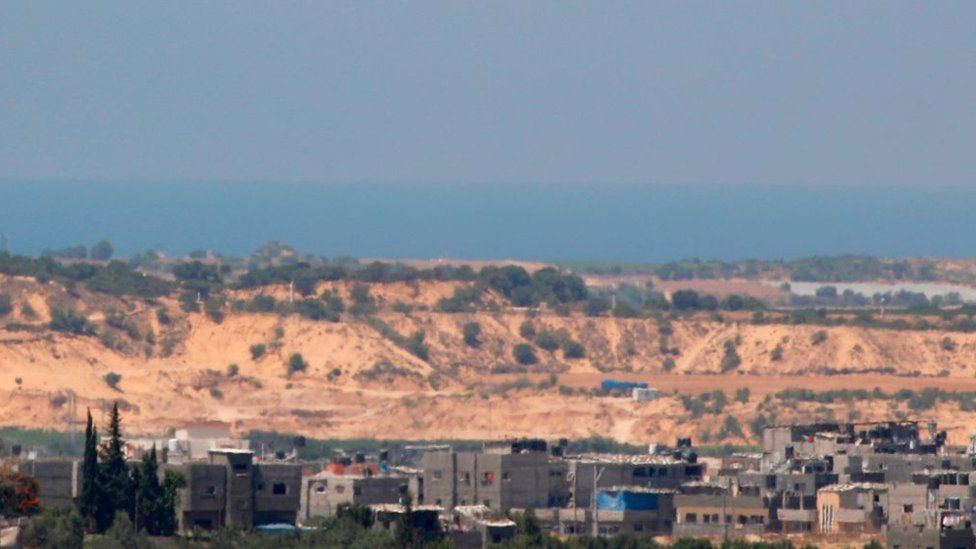One of the first Israeli settlements to come under attack when Hamas militants surged into Israel early on Saturday morning was the Nir Am kibbutz, where local people put up a fierce defence and drove the attackers away.
“I took my pistol, my clothes, my bulletproof vest and the other thing was cigarettes,” Adam says, calmly recounting being jolted from his bed by the sound of gunfire at 06:30 on Saturday. “We started to kill everyone who came to the fence.”
He’s been labelled the hero of Nir Am, the saviour of his kibbutz, a community of around 400 people living just 2km (1.2 miles) from Gaza.
“I took the walkie-talkie and I said this line again and again: ‘No-one will enter Nir Am, no-one will enter Nir Am.’”
Adam is 46, ex-special-forces, so we can’t show his face or use his full name. His head is shaved, a boxer, not the biggest man but you wouldn’t mess with him. It’s clear he can handle himself.
He was joined by other men from the kibbutz, he says.
“Civilians who don’t know how to fight but have got a lot of heart. Two or three with special forces experience but the others… just regular men, they work in IT. Regular men, but very, very special.”
Together they fought for between three and five hours – Adam isn’t exactly sure. Then came a lull.

“We thought it was all good but then came the second wave, between eight to 10 terrorists with machine guns, with rocket-propelled grenades… They were close, 10m to 15m. I ran towards them and stood and shot and killed… a bullet to the head.”
What was he feeling in the heat of this gun battle? “My mind is regular I’m a warrior, I’m a fighter, this is what I’m built for.”
And he was clear what was at stake. The people of Nir Am would have been slaughtered, he says, just as they were at some other kibbutzim, communities organised as collectives, often farms..
“They will run to the houses and kill the women and the kids. That kept us fighting, killing. We didn’t let anybody get into the kibbutz. Nobody got hurt.”
Now Nir Am residents are living in a Tel Aviv hotel. They don’t know when they’ll be able to return. Adam fears some will be too afraid.
He’s thankful for the hospitality. “It’s very warming, it’s like another house,” he says. “And all of Israel has sent us clothes and food.”
But even here, the evacuees aren’t entirely safe. Our conversation is interrupted by sirens warning of another rocket attack. Adam calmly guides us to the shelter, where families are huddled, some of the children crying.
“It’s nothing for us, we live in the south. It’s a regular thing for us,” Adam says.
Adam is critical of Israel’s government, particularly the failure of the security services to predict and prepare for the attack.

“It’s our leadership. They’re under test now. Our leadership don’t deserve us,” he says.
Some 1,300 people died in the unprecedented Hamas attack on Israel, and at least 150 people were taken prisoner. Israel has retaliated with air strikes on Gaza, which have also killed 1,300. It has also closed the border preventing the entry of fuel and food.
And what about the future?
Adam says he thinks most people in Gaza are good people who want a normal life, but he wants overwhelming military action to deal with Hamas.
“We can’t have the same solution, we need something much, much stronger,” he says.
But he says he doesn’t want to see Israeli troops enter Gaza. “They (Hamas) want us to do that because they’ve got traps in there. This would be wrong.”
Only one resident of Nir Am was killed, a young man who was at the music festival stormed by Hamas. Adam and his civilian force kept the kibbutz safe.

More on Israel Gaza war
- Follow live: Latest updates
- Hostages: Who are the people taken from Israel?
- Bowen: Inside Israeli border village where Hamas killed families in their homes
- Gaza: Children screamed in street as we fled 2am air strike
- Explained: What’s going on in Gaza and Israel, and why now?
- History behind the story: The Israel-Palestinian conflict
